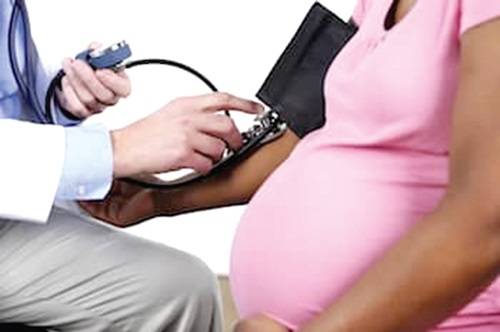Racing hearts, rising risk: High Blood Pressure threatens motherhood
Hypertension in Pregnancy: A Growing Concern in Ghana.
Hypertension during pregnancy is becoming an increasingly critical issue in Ghana, yet it often goes unnoticed. Many expectant mothers remain unaware of the warning signs until severe complications arise. Health professionals emphasize that without proper management, hypertensive disorders can pose severe risks to both the mother and the baby.
Understanding Hypertension in Pregnancy
Hypertension in pregnancy refers to high blood pressure that develops during gestation, which can endanger both maternal and fetal health. It can manifest before pregnancy, during, or even after childbirth. Eric Amoh, a Public Health Nurse at the Akwapim South Health Directorate, notes that pregnancy-induced hypertension typically appears after 20 weeks of gestation. “If it begins before 20 weeks, we suspect there may be an underlying health issue,â€
he explains.Certain demographics are more susceptible to developing hypertension during pregnancy. Teenage mothers, first-time pregnant women, those expecting multiples, and women over 40 are at a heightened risk. Additionally, a family history of hypertension can further increase these risks.
If hypertension goes unnoticed and untreated, it can escalate into pre-eclampsia, a severe condition characterized by high blood pressure and protein in the urine. If pre-eclampsia is left unaddressed, it can progress to eclampsia, which can lead to life-threatening seizures.
“The most alarming cases are often those where women ignore symptoms until it's too late,†Mr. Amoh shares. He recounts a case in which a pregnant woman assumed her swollen feet indicated she was carrying twins. By the time she sought medical attention, her blood pressure was critically high, necessitating an emergency intervention.
Hypertensive disorders can also lead to serious complications for the baby, including preterm birth, low birth weight, and even stillbirth.
The Need for Awareness and Support
Health experts agree that tackling hypertension in pregnancy requires a combination of medical treatment and societal support. “Family members, including husbands and in-laws, play a significant role in maternal health decisions,†Mr. Amoh points out. When they encourage regular check-ups and promote healthy lifestyle changes, the outcomes for mother and baby improve significantly.
Community health initiatives and media campaigns are essential for combatting cultural misconceptions that prevent women from seeking timely medical care.
Recognizing the Warning Signs
According to health advocate Naana Agyare, education about the warning signs of hypertension during pregnancy is crucial. Many women misinterpret early symptoms as typical pregnancy discomforts and delay seeking help.
Key warning signs include:
- Severe headaches
- Swelling of the hands, face, and feet
- Vision changes, such as blurred vision or seeing spots
- Persistent upper abdominal pain
- Sudden, excessive weight gain
- Shortness of breath
“Any of these symptoms should prompt immediate medical attention. The earlier hypertension is addressed, the better the outcomes for both mother and child,†Ms. Agyare advises.
Lifestyle Modifications and Prevention
While physiological changes during pregnancy can contribute to hypertension, certain lifestyle modifications can significantly reduce risks. Regular antenatal care is paramount, yet many women miss these vital check-ups due to work, financial constraints, or cultural beliefs. “These visits are crucial for early detection and management,†Ms. Agyare emphasizes.
Moderate exercise can also help. Pregnant women are encouraged to engage in safe physical activities, such as walking and stretching, which can improve circulation and help regulate blood pressure.
Diet plays a complex role in managing hypertension during pregnancy. Although not all cases are diet-related, maintaining a balanced intake of fresh fruits, vegetables, and whole grains, while reducing salt in tacan contribute to better healt. 
For 32-year-old Abena Asare, a first-time mother, her experience with hypertension during pregnancy was both frightening and enlightening. “At my 24-week check-up, my blood pressure was dangerously high, and I had no symptoms, so I was completely unaware,†she recalls. After being placed on medication and advised to modify her lifestyle, Abena had to focus on resting, eating healthier, and monitoring her blood pressure daily. “I’m grateful I caught it early,†she adds, underscoring the importance of awareness and regular check-ups.
Conclusion
Hypertension in pregnancy is a silent yet dangerous threat in Ghana. Increased education, early detection, and improved access to maternal health care can save lives. As Mr. Amoh states, “No mother should lose her life to a condition that can be managed with the right care.†By recognizing the risks, taking preventive measures, and promoting regular antenatal visits, Ghana can mitigate the burden of hypertensive disorders in pregnancy, ensuring safer births for mothers and their babies.




No comments yet
Be the first to share your thoughts!